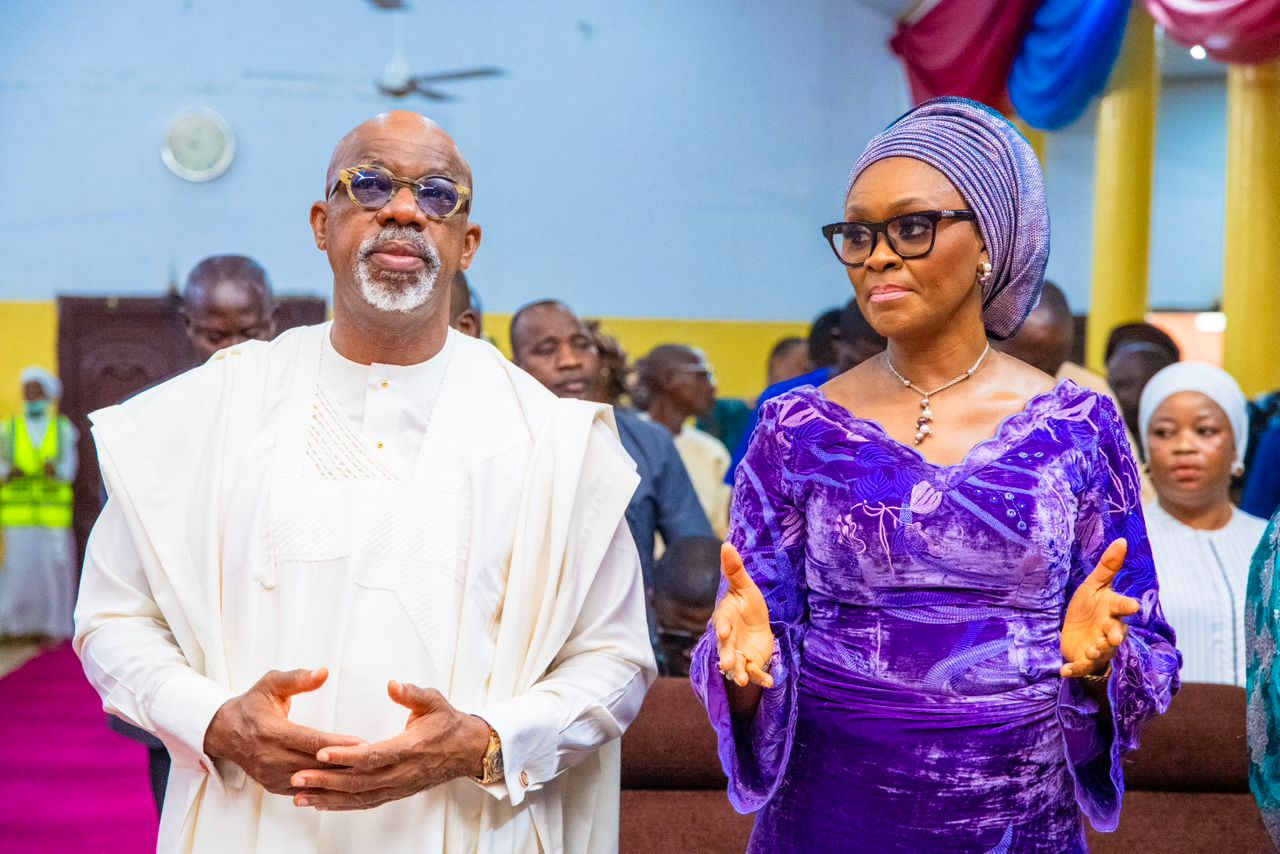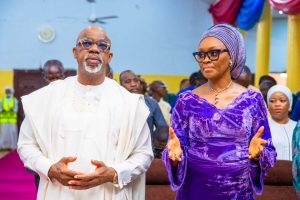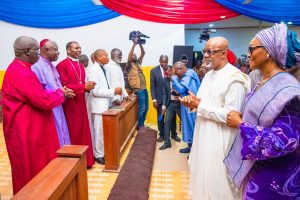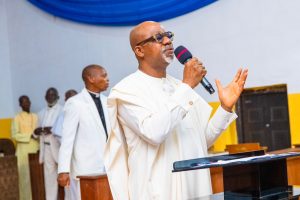society
Abiodun: Five Years of Governance Very Challenging, But Most Beautiful Experience of My Life

…Tackles Adebutu over comments on Shagamu-Iperu road
Ogun State Governor, Prince Dapo Abiodun, has described the past five years of his administration as challenging, but added that his faith in God had brought the victory he desired.
Speaking during his 64th Birthday and 5th Year Thanksgiving Service held in his honour at the Ogun State Government House Chapel, Oke-Igbein, Abeokuta, on Sunday, Governor Abiodun recalled his journey to power despite all odds, attributing his victory to God Almighty.
He said: “The process through which I emerged as Governor was a very unusual one; one in which my predecessor who was in the same party with me was fighting me and campaigning for another person in another party, and I will sit down and ask myself, ‘Baba God, this is very unusual, why do I have to go through so much to assume this office?’ And then I will answer myself that it is because God wants to take that glory.
“The last five years of governance over the state of Ogun for me has been one of the most beautiful experiences of my life. It’s been extremely turbulent, it’s been very challenging, particularly, it has been rancorous. But the most important thing is that in all of this, God has given us victory.”
Gov Abiodun said his government was taking giant steps to reshape the economy of the state and that the steps were yielding results.
One of such steps, according to him, is the plan to make Ogun an oil producing State, as the Ministry of Petroleum Resources would soon begin oil exploration in the state.
“Only on Friday, the leadership of the Ministry of Petroleum led by the Minister of State, Petroleum Resources (oil), Senator Heineken Lokpobiri, was here with three others and the chairman of Shell to make an announcement that they would soon begin to drill oil in Ogun State,” he said.
Prince Abiodun also seized the opportunity to respond to comments by the governorship candidate of the Peoples Democratic Party (PDP) in the last general election, Ladi Adebutu, on the Sagamu-Iperu road project.
Adebutu had criticised the 8-kilometer Sagamu-Iperu road project of the state government.
The governor said his focus was to continue the positive trajectory of the Gateway State and not to dwell on the submission of a man who could not see the over 600km of roads across the length and breadth of Ogun State done by his administration.
Prince Abiodun said he had learnt not to respond to people who had developed the habit of barking whenever they are no longer in the spotlight.
“I read on one of the papers that someone was saying that he was embarrassed that I was commissioning an 8-kilometre road, and a counterpart of mine was commissioning a 77-kilometer road,” he said, adding that he had learnt not to respond to such ignorant remarks.
He wondered that despite the stupendous wealth of the Adebutu family, the road that runs through their house was in a deplorable state for a long time and the family could not deploy a fraction of their wealth to repair it.
Governor Abiodun promised that his administration would continue to make life comfortable for the people of the state by embarking on the provision of more infrastructure that would, in turn, improve their well-being.
Earlier in his message, the Shepherd in charge of Grace Baptist Church, Abeokuta, Rev (Dr) Emmanuel Ajayi, who took his sermon from Psalm 92 verse 1, said that it was a good thing to praise the Lord because of who He is.
Rev. Ajayi, giving thanks to God brings more blessings to those who praise Him.
While calling on the people of God to imbibe the culture of giving thanks to God in their closet, Rev. Ajayi said that praises help Christians to show their gratitude to God Almighty.
Meanwhile, the Special Adviser to the Governor on Information and Strategy, Hon. Kayode Akinmade had, in an earlier statement in response to Adebutu’s comments, said the defeated PDP governorship candidate lacked the requisite mental capacity to assess Governor Abiodun’s performance in office.
He said: “It is rather laughable if not completely bizarre to learn that a suspect in the on going case of money laundering and electoral banditry in the 2023 gubernatorial election in Ogun State, Oladipupo Adebutu, could summon courage to speak on any issue whatsoever in the public space, not to talk of issues pertaining to governance.
“Adebutu’s recent gibberish in the media, where he queried the leadership capability of Governor Dapo Abiodun and his administration’s performance eloquently gives out the Peoples Democratic Party’s governorship candidate as a man with little mind and zero cognitive capacity.
“Obviously, no right thinking individual with sound mind could just wake up on the wrong side of his bed and start discrediting what the global community is applauding from all fronts. While we understand the limitations of Oladipupo Adebutu as a certified indolent and overfed brat, we never realized his mannerless tendency had grown to this level of nuisance.
“For crying out loud, what does a man that could not manage an ordinary small-scale business know about the government that superintend the affairs of over six million people in a geographical location of over 16000 square kilometres.
“Adebutu antecedents are majorly rooted in the life of recklessness and uncontrollable verbal diarrhoea, with no single achievement except the free money of his octogenarian father.”
Akinmade also said Adebutu pretended to be blind to the developmental projects and policies of Governor Abiodun in all the sectors of the State’s economy, ignorantly thinking he could score cheap political points and sneak out of his present oblivion.
“Like he himself rightly observed, he should be ashamed of himself for coming from the same town with a personality like Prince Dapo Abiodun, who has showcased leadership acumen and rare sagacity for inclusive governance beyond expectations.
“We hereby advise Adebutu to concentrate on his criminal case in court and face it squarely, while it is necessary for him to go for rehabilitation after facing the full wrath of the law on his atrocities,” he said.
society
Ramadan: Adron Homes Felicitates Muslims, Preaches Hope and Unity

Ramadan: Adron Homes Felicitates Muslims, Preaches Hope and Unity
Adron Homes & Properties Limited has congratulated Muslim faithful on the commencement of the holy month of Ramadan, urging Nigerians to embrace the virtues of sacrifice, discipline, and compassion that define the season.
In a statement made available to journalists, the company described Ramadan as a period of deep reflection, spiritual renewal, and strengthened devotion to faith and humanity.
According to the management, the holy month represents values that align with the organisation’s commitment to integrity, resilience, and community development.
“Ramadan is a time that teaches patience, generosity, and selflessness. As our Muslim customers and partners begin the fast, we pray that their sacrifices are accepted and that the season brings peace, joy, and renewed hope to their homes and the nation at large,” the statement read.
The firm reaffirmed its dedication to providing affordable and accessible housing solutions to Nigerians, noting that building homes goes beyond structures to creating environments where families can thrive.
Adron Homes further urged citizens to use the period to pray for national unity, economic stability, and sustainable growth.
It wished all Muslim faithful a spiritually fulfilling Ramadan.
Ramadan Mubarak.
society
Underfunding National Security: Envelope Budgeting Fails Nigeria’s Defence By George Omagbemi Sylvester

Underfunding National Security: Envelope Budgeting Fails Nigeria’s Defence
By George Omagbemi Sylvester | Published by saharaweeklyng.com
“Fiscal Rigidity in a Time of Crisis: Lawmakers Say Fixed Budget Ceilings Are Crippling Nigeria’s Fight Against Insurgency, Banditry, and Organized Crime.”
Nigeria’s legislature has issued a stark warning: the envelope budgeting system; a fiscal model that caps spending for ministries, departments, and agencies (MDAs) is inadequate to meet the country’s escalating security challenges. Lawmakers and budget analysts argue that rigid fiscal ceilings are undermining the nation’s ability to confront insurgency, banditry, kidnapping, separatist violence, oil theft and maritime insecurity.
The warning emerged during the 2026 budget defence session for the Office of the National Security Adviser (ONSA) at the National Assembly in Abuja. Senator Yahaya Abdullahi (APC‑Kebbi North), chairman of the Senate Committee on National Security and Intelligence, decried the envelope system, noting that security agencies “have been subject to the vagaries of the envelope system rather than to genuine needs and requirements.” The committee highlighted non-release or partial release of capital funds from previous budgets, which has hindered procurement, intelligence and operational capacity.
Nigeria faces a multi‑front security crisis: persistent insurgency in the North‑East, banditry and kidnappings across the North‑West and North‑Central, separatist tensions in the South‑East, and piracy affecting Niger Delta oil production. Despite declarations of a national security emergency by President Bola Tinubu, lawmakers point to a “disconnect” between rhetoric and the actual fiscal support for agencies tasked with enforcement.
Experts warn that security operations demand flexibility and rapid resource allocation. Dr. Amina Bello, a public finance specialist, said: “A static budget in a dynamic threat environment is like sending firefighters with water jugs to a forest fire. You need flexibility, not fixed ceilings, to adapt to unforeseen developments.”
The Permanent Secretary of Special Services at ONSA, Mohammed Sanusi, detailed operational consequences: irregular overhead releases, unfulfilled capital appropriations, and constrained foreign service funds. These fiscal constraints have weakened intelligence and covert units, hampering surveillance, cyber‑security, counter‑terrorism and intelligence sharing.
Delayed capital releases have stalled critical projects, including infrastructure upgrades and surveillance systems. Professor Kolawole Adeyemi, a governance expert, emphasized that “budgeting for security must allow for rapid reallocation in response to threats that move faster than political cycles. Envelope budgeting lacks this essential flexibility.”
While the National Assembly advocates fiscal discipline, lawmakers stress that security funding requires strategic responsiveness. Speaker Abbas Ibrahim underscored that security deserves “prominent and sustained attention” in the 2026 budget, balancing oversight with operational needs.
In response, the Senate committee plans to pursue reforms, including collaboration with the executive to restructure funding, explore supplementary budgets and ensure predictable and sufficient resources for security agencies. Experts warn that without reform, criminal networks will exploit these gaps, eroding public trust.
As one policy analyst summarized: “A nation declares a security emergency; but if its budget does not follow with real resources and oversight, the emergency remains rhetorical.” Nigeria’s debate over envelope budgeting is more than an accounting dispute; it is a contest over the nation’s security priorities and its commitment to safeguarding citizens.
society
Rev. Mother Kehinde Osoba (Eritosin) Celebrates as She Marks Her Birthday

Rev. Mother Kehinde Osoba (Eritosin) Celebrates as She Marks Her Birthday
Today, the world and the body of Christ rise in celebration of a rare vessel of honour, Rev. Mother Kehinde Osoba, fondly known as Eritosin, as she marks her birthday.
Born a special child with a divine mark of grace, Rev. Mother Eritosin’s journey in God’s vineyard spans several decades of steadfast service, spiritual depth, and undeniable impact. Those who know her closely describe her as a prophetess with a heart of gold — a woman whose calling is not worn as a title, but lived daily through compassion, discipline, humility, and unwavering faith.
From her early days in ministry, she has touched lives across communities, offering spiritual guidance, prophetic insight, and motherly counsel. Many testify that through her prayers and teachings, they encountered God in a deeply personal and transformative way. Near and far, her influence continues to echo — not only within church walls, but in homes, families, and destinies reshaped through her mentorship.
A mother in every sense of the word, Rev. Mother Kehinde Osoba embodies nurture and correction in equal measure. As a grandmother, she remains energetic in purpose — accommodating the wayward, embracing the rejected, and holding firmly to the belief that no soul is beyond redemption. Her life’s mission has remained consistent: to lead many to Christ and guide them into the light of a new beginning.
Deeply rooted within the C&S Unification, she stands tall as a spiritual pillar in the Cherubim and Seraphim Church globally. Her dedication to holiness, unity, and prophetic service has earned her widespread respect as a spiritual matriarch whose voice carries both authority and humility.
As she celebrates another year today, tributes continue to pour in from spiritual sons and daughters, church leaders, and admirers who see in her a living reflection of grace in action.
Prayer for Rev. Mother Kehinde Osoba (Eritosin)
May the Almighty God, who called you from birth and anointed you for His service, continually strengthen you with divine health and renewed vigour.
May your oil never run dry, and may your prophetic mantle grow heavier with greater glory.
May the lives you have nurtured rise to call you blessed.
May your latter years be greater than the former, filled with peace, honour, and the visible rewards of your labour in God’s vineyard.
May heaven continually back your prayers, and may your light shine brighter across nations.
Happy Birthday to a true Mother in Israel — Rev. Mother Kehinde Osoba (Eritosin).
More years.
More anointing.
More impact.
If you want this adapted for a newspaper page, church bulletin, Facebook post, or birthday flyer, just tell me the format and tone.
-

 celebrity radar - gossips6 months ago
celebrity radar - gossips6 months agoWhy Babangida’s Hilltop Home Became Nigeria’s Political “Mecca”
-

 society6 months ago
society6 months agoPower is a Loan, Not a Possession: The Sacred Duty of Planting People
-

 society5 months ago
society5 months agoReligion: Africa’s Oldest Weapon of Enslavement and the Forgotten Truth
-

 news6 months ago
news6 months agoTHE APPOINTMENT OF WASIU AYINDE BY THE FEDERAL GOVERNMENT AS AN AMBASSADOR SOUNDS EMBARRASSING














